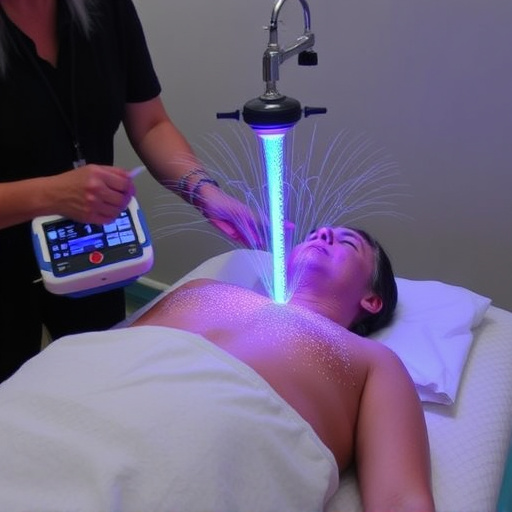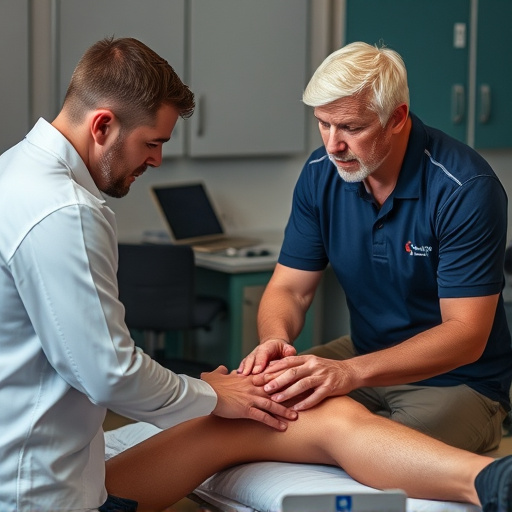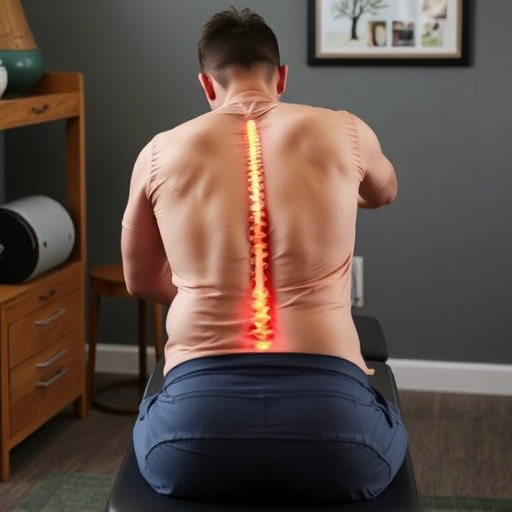For persistent plantar fasciitis pain beyond traditional treatments, consider shockwave therapy. This non-invasive approach targets chronic inflammation and swelling around heels and arches, accelerating healing, reducing symptoms, and restoring mobility for faster return to comfortable standing and walking. Even after unsuccessful other therapies, shockwave plantar fasciitis treatment offers hope.
Do you suffer from persistent foot pain that just won’t let up? It could be plantar fasciitis, a common yet often chronic condition. If traditional treatments haven’t relieved your symptoms, it might be time to consider shockwave plantar fasciitis therapy. This non-invasive approach targets deep inflammation and can restore mobility. In this article, we explore signs indicating you may need prompt intervention and delve into how shockwaves could potentially alleviate your pain and help you walk with ease again.
- Persistent Pain: When Plantar Fasciitis Won't Go Away
- Inflammation and Swelling: Signs of Severe Fasciitis
- Impaired Mobility: Can Shockwave Therapy Help You Walk Again?
Persistent Pain: When Plantar Fasciitis Won't Go Away

If you’ve been dealing with plantar fasciitis for several weeks or even months and the pain persists despite rest, stretching, and over-the-counter treatments, it might be time to consider shockwave plantar fasciitis therapy. This condition often presents as a sharp or aching pain in the bottom of the foot, specifically along the arch and heel, that worsens with activity but can also linger even when you’re not walking. If your symptoms haven’t shown any improvement, seeking professional help is crucial for effective relief.
Chronic pain relief from plantar fasciitis is possible with non-invasive treatments like shockwave therapy. Unlike conventional methods that focus on managing symptoms, this innovative approach directly targets the source of the problem to promote healing and reduce inflammation in the affected area, offering a promising solution for those struggling with persistent neck pain relief or chronic pain relief from plantar fasciitis.
Inflammation and Swelling: Signs of Severe Fasciitis

Chronic inflammation and swelling are clear signs indicating that your plantar fasciitis has progressed beyond mild stages. When left untreated, the fascia—a thick band of tissue connecting the heel bone to the toes—becomes severely inflamed, leading to intense pain, especially during the first steps after waking or after periods of inactivity. This condition is often characterized by visible swelling around the heel and arch areas, making walking or standing uncomfortable.
If you experience persistent pain and noticeable swelling, it’s crucial to consider shockwave plantar fasciitis treatment. Unlike invasive procedures, shockwave therapy offers a non-invasive approach to managing severe fasciitis. Personalized treatment plans tailored to individual needs can help accelerate healing and alleviate symptoms, ensuring you’re back on your feet comfortably sooner.
Impaired Mobility: Can Shockwave Therapy Help You Walk Again?

If you’re experiencing impaired mobility due to shockwave plantar fasciitis, it might feel like walking is a distant memory. This condition can significantly impact your ability to move around comfortably and pain-free. However, shockwave therapy offers hope for improved mobility and quicker recovery. It’s an innovative non-invasive treatment that stimulates the healing process in damaged tissues, potentially restoring your range of motion.
Unlike traditional methods focusing on rest and medication, shockwave therapy targets the source of the issue. By delivering acoustic waves to the affected area, it can accelerate the body’s natural repair mechanisms. This not only aids in sports injury recovery but also supports injury rehabilitation for those with chronic plantar fasciitis. Even if you’ve tried various treatments without success, a spinal adjustment using shockwave technology might be the game-changer you need to regain your mobility and get back on your feet again.
If you’ve exhausted conservative treatments for plantar fasciitis and persistent pain persists, it may be time to consider shockwave plantar fasciitis therapy. By targeting tissue regeneration and reducing inflammation, this non-invasive approach can offer relief and restore mobility, allowing you to get back on your feet comfortably. Don’t let chronic fasciitis slow you down— explore the benefits of shockwave treatment as a potential solution for faster recovery.














